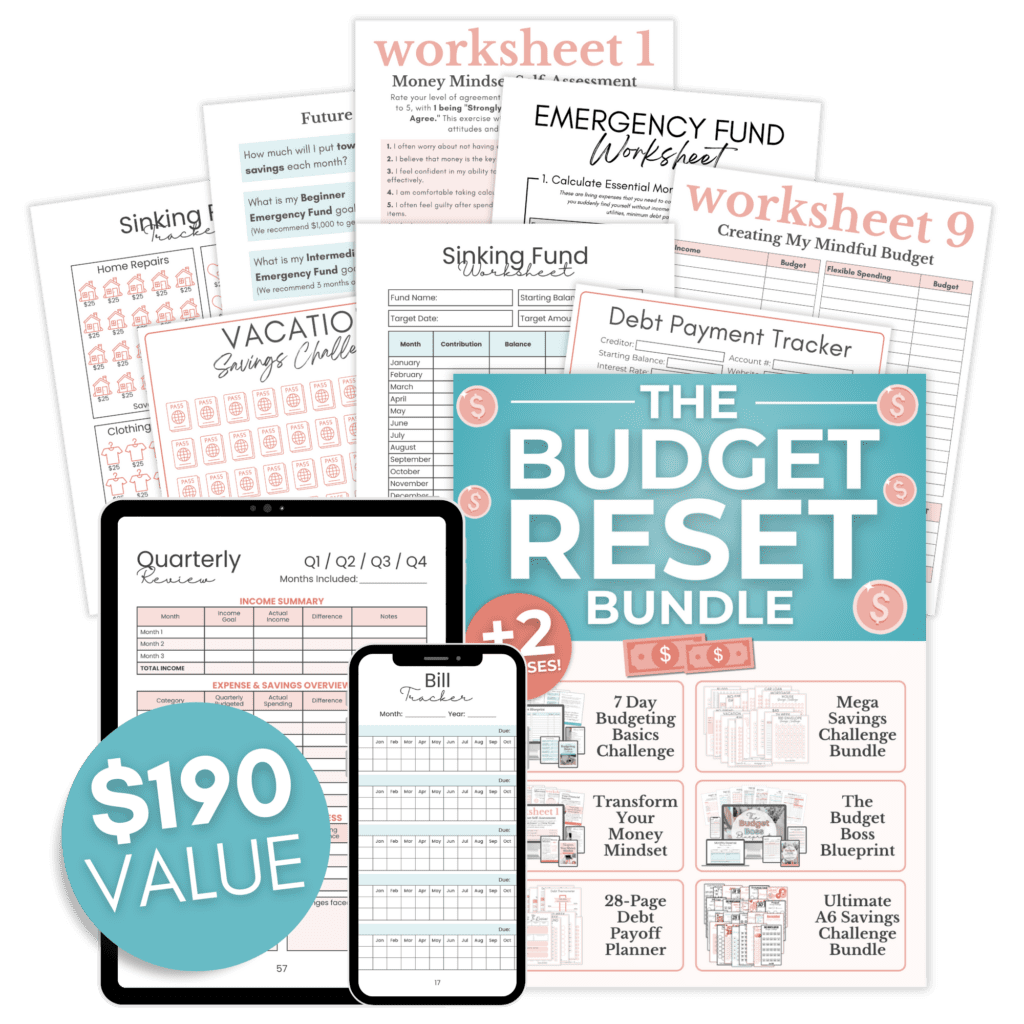What Is a Money Mindset & Why It’s Sabotaging Your Budget

You’ve read the budgeting advice, downloaded the spreadsheets, and even started tracking your spending—but somehow, it still feels like you’re spinning your wheels.
You make progress one month and backslide the next. You wonder, “Why can’t I just stick to a budget like everyone else?”
Here’s a possibility you may not have considered:
It’s not your math skills.
It’s not your income.
It might actually be your money mindset.
Your money mindset is the set of beliefs and thoughts you carry about money—what it means, how it works, and what’s possible for you.
And if those beliefs are rooted in fear, guilt, or scarcity, they can quietly sabotage even your best financial efforts.
In this post, we’re breaking down what a money mindset really is, how it might be impacting your budget without you even realizing it, and what you can do to start shifting it for good.
This is powerful inner work that can change how you handle money forever—and if you’re ready to go deeper, my Transform Your Money Mindset guide walks you through it step-by-step.
What Is a Money Mindset?
Your money mindset is the collection of beliefs, attitudes, and emotional patterns you have about money. It’s the internal script that runs in the background every time you think about saving, spending, earning, or budgeting.
It’s not just about how much you know—it’s about what you believe.
For example:
- Do you believe you’ll always be “bad with money”?
- Do you think people who have money are greedy?
- Do you feel uncomfortable asking for a raise, or saving for something just for you?
These beliefs often come from our upbringing, early financial experiences, cultural messaging, and even how our parents handled money.
And while we may not realize it, those thoughts can shape our financial behaviors in powerful ways—often keeping us stuck in patterns we’re desperate to break.
The good news? Your money mindset is not permanent.

Once you become aware of it, you can begin to question it, challenge it, and rewrite the narrative into something that actually supports the life you want.
That’s what mindset work is all about—not pretending money doesn’t matter, but learning how to manage it from a place of confidence, not fear.
How a Negative Money Mindset Sabotages Your Budget
You can have the perfect budgeting app, a spreadsheet with all the formulas, and the best of intentions—but if your money mindset is working against you, you’ll still feel like you’re getting nowhere.
Here’s how a negative money mindset shows up in real life (even if you’re following a plan):
- You avoid checking your bank account because it triggers anxiety or shame
- You feel guilty spending money, even on things you truly need
- You tell yourself budgeting “never works” for you, so you give up at the first setback
- You overspend emotionally, using shopping as a coping mechanism
- You feel like no matter what you do, you’ll always be behind
Sound familiar?
This inner dialogue might not seem like a big deal—but it creates a cycle of frustration and self-sabotage.
You start a new budget feeling motivated, hit one rough patch, and immediately fall into the trap of “I’m just bad with money.” That belief becomes a self-fulfilling prophecy.
But here’s the truth: it’s not that you’re bad with money.
You’ve just been carrying around beliefs that don’t support your goals—and those beliefs can absolutely be challenged and changed.
When you shift your mindset, budgeting stops feeling like punishment and starts feeling like a tool for freedom. That’s the mindset we want to build.
Signs You Might Be Stuck in a Toxic Money Loop
Sometimes, the hardest part of changing your money mindset is realizing just how much it’s affecting your day-to-day habits.
These mindset blocks don’t always shout—they whisper. They show up in quiet, subtle ways that seem like “just the way things are.”

Here are some common signs that you might be stuck in a toxic money loop:
- You avoid looking at your finances because they make you feel overwhelmed or ashamed
- You tell yourself “I’m just not good with money” and believe it’s something you’ll never figure out
- You feel guilty any time you spend money, even on necessities
- You self-sabotage your progress, like saving $200 one week and blowing it on impulse the next
- You believe you’ll always be broke, no matter how hard you work
- You get stuck in all-or-nothing thinking (“If I can’t pay off all my debt this year, why bother?”)
These beliefs can quietly derail even your best efforts. And the worst part? They often run so deep, we don’t even notice them—we just live by them.
But identifying these patterns is the first step to breaking free from them. Once you name the belief, you take away its power. That’s when real change begins.
If any of these signs hit home, it’s not a reason to feel discouraged—it’s a reason to get curious. Your mindset isn’t fixed. It’s a story that can be rewritten.
Ready to Finally Take Control of Your Money?
The Budget Reset Bundle gives you everything you need to stop the paycheck-to-paycheck cycle, create a real budget that actually works, and start saving fast. No fluff — just real tools for real change.

How to Start Shifting Your Money Mindset
Changing your money mindset doesn’t happen overnight—but small shifts can lead to massive progress over time.
The goal isn’t to force yourself to “think positive” or ignore your financial reality. It’s to become more aware of the thoughts that aren’t serving you—and choose new ones on purpose.
Here are a few ways to get started:
1. Get Curious Instead of Judgmental
Instead of beating yourself up when you overspend or avoid your budget, ask:
“Why did I do that? What was I feeling in that moment?”

Curiosity opens the door to growth—judgment slams it shut.
2. Notice the Stories You Tell Yourself About Money
Pay attention to your internal dialogue. Do you say things like:
“I’ll never get ahead.”
“I just don’t make enough.”
“Budgeting is too hard for me.”
These stories can feel like facts—but they’re often just beliefs you’ve never questioned.
3. Track the Wins—Even the Tiny Ones
Shifting your mindset is easier when you have evidence.
Did you say no to a spending temptation? Pay an extra $10 toward debt?
That counts. Write it down. Progress builds belief.
4. Surround Yourself With Empowering Money Content
If your feed is full of fear, comparison, or consumerism, it’s going to be hard to stay grounded.
Follow people and read content that helps you feel motivated, capable, and in control of your finances (hint: you’re in the right place 😉).
5. Do the Deeper Work
Mindset work isn’t just about the present—it’s about understanding where your beliefs came from.
Start journaling about what you learned about money growing up. What messages did you receive (directly or indirectly) from family, culture, or school?
You’ll be surprised how much clarity this brings—and how freeing it feels to let go of those old patterns.
If you’re ready to dig deeper into this kind of work, my Transform Your Money Mindset guide was created to help you unpack those beliefs and create new, empowering ones—without toxic positivity or unrealistic advice. It’s honest, practical, and life-changing.

Real Budgeting Becomes Easier When Your Mindset Changes
If you’ve ever felt like budgeting is just one more thing you’re failing at, it’s probably not the budget—it’s your mindset around it.
When you’re constantly operating from beliefs like “I’ll never get ahead,” or “This isn’t going to work anyway,” it’s nearly impossible to stick to any plan, no matter how good it is.
RECOMMENDED READ: A Beginner’s Guide to Creating a Monthly Budget
But when your mindset starts to shift? Everything else starts to feel lighter.
You begin to:
- View your budget as a tool for peace, not punishment
- Let go of the guilt around past money mistakes
- Feel empowered instead of overwhelmed when you look at your numbers
- Make spending and saving decisions based on your goals, not fear
This is the part most budgeting advice skips over. They’ll give you the spreadsheet—but not the belief system you need to keep using it when things get tough.
That’s where money mindset work becomes a game changer.
Once your mindset is in a better place, you’ll find it so much easier to stick with tools like my free Ultimate Budget Makeover Planner or my 7-Day Budgeting Basics Challenge—because you’re no longer operating from a place of shame, panic, or “I’ll never get this right.”
Mindset work clears the emotional clutter—and that’s what makes room for actual financial progress.
Final Thoughts: You’re Not Bad With Money—Your Mindset Just Needs a Reset
If you’ve been telling yourself that you’re “just bad with money,” it’s time to let that story go. You are not broken. You’re not behind. And you’re definitely not alone.
Most of us weren’t taught how to manage money—let alone how to navigate the emotions and beliefs tied to it.
What you’re dealing with isn’t a personal flaw. It’s a mindset that was shaped by years of experience, environment, and repetition.
The good news? It can be changed.
Shifting your money mindset is the first step toward budgeting with confidence, saving with purpose, and actually feeling in control of your financial future.
It’s not about being perfect. It’s about being aware—and willing to grow.
If you’re ready to reset your beliefs and finally stop self-sabotaging your financial progress, grab my Transform Your Money Mindset guide.
It walks you through this process in a real, practical way—no fluff, no toxic positivity, just honest tools to help you think differently about money and start building the life you actually want.
You don’t need a new budgeting app—you need a new perspective. And it starts right here.

